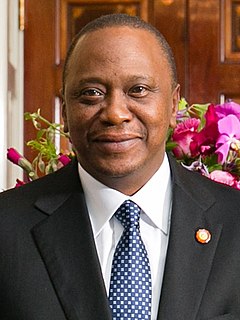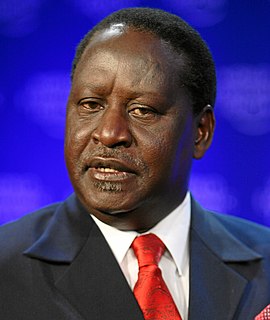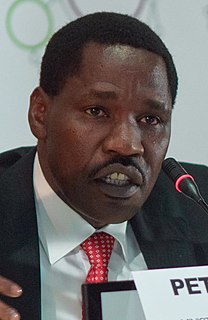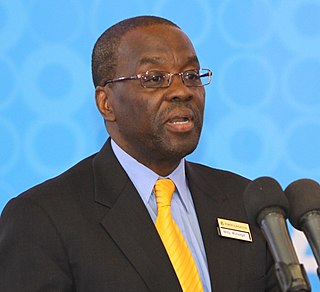
Uhuru Muigai Kenyatta is a Kenyan politician and businessman who is the fourth and current President of the Republic of Kenya. He served as the Member of Parliament (MP) for Gatundu South from 2002 to 2013. Currently the party leader and a member of the Jubilee Party of Kenya, he was previously involved with The National Alliance and before that the Kenya African National Union.

Elections in Kenya take place within the framework of a multi-party democracy and a presidential system. The President, Senate and National Assembly are directly elected by voters, with elections organised by the Independent Electoral and Boundaries Commission (IEBC).
The Forum for the Restoration of Democracy–Asili (FORD–Asili) is a political party in Kenya. It is commonly known as FORD-Asili. Asili means 'original' in Swahili. FORD-Asili has its origins in the original Forum for the Restoration of Democracy. In August 1992, the original FORD split into two factions. The Odinga-Kijana faction remained in the original Nairobi party headquarters at Agip House on Haile Selassie Avenue whilst the Matiba-Shikuku faction moved to Muthithi House on Muthithi Road in Westlands. Thus for a period prior to registration as independent parties, the two factions were known as FORD-Agip and FORD-Muthithi. FORD-Agip was registered as FORD-Kenya whilst FORD-Muthithi was registered as FORD-Asili. Both parties went on to field competitive presidential candidates in the December 1992 general elections. FORD-Asili's candidate Kenneth Matiba polled second to KANU's Daniel Toroitich arap Moi in 1992 and won 31 parliamentary seats, dominating Murang'a District in Central Province and garnering a credible portion of the votes in Eastern and Western Provinces. By 1997, Kenneth Matiba and Martin Shikuku disagreed on a number of matters resulting in Matiba's departure from the party, his destruction of his voter's card and refusal to stand in the 1997 Presidential Elections. Martin Shikuku therefore won the party's presidential nomination and went on to win only 0.6% of the Presidential Vote, with the party winning 1 National Assembly seat. In the 2002 election, Ford-Asili won 2 out of 212 elected seats and did not field a presidential candidate, choosing to support the successful NARC alliance candidate Mwai Kibaki. In 2007, Ford-Asili supported Mwai Kibaki again as presidential candidate, this time under the Party of National Unity banner and won a single parliamentary seat in its own right. In the same election, the party's original presidential candidate Kenneth Matiba re-registered as a voter and stood under the Saba Saba-Asili banner. Matiba came in 7th with only 0.081% of the vote.

Masinde Muliro was a Kenyan politician, one of the central figures in the shaping of the political landscape in Kenya. A renowned anti-colonial activist, he campaigned for the restoration of multi-party democracy in Kenya in his later years. He was a ruthless negotiator and a proponent of peaceful but focused politics. He had a reputation for integrity rivaled only by Ronald Ngala. Considered by some as one of the best leaders that never became president, it has been speculated that had he not died, he may have beaten Daniel arap Moi for the presidency in 1992.

Raila Amolo Odinga is a Kenyan politician who served as Prime Minister of Kenya from 2008 to 2013, and has served as Leader of the Opposition since 2013. He was Member of Parliament (MP) for Langata from 1992 to 2013. He served in the Cabinet of Kenya as Minister of Energy from 2001 to 2002, and as Minister of Roads, Public Works and Housing from 2003 to 2005. Odinga was appointed High Representative for Infrastructure Development at the African Union Commission in 2018.
John Njoroge Michuki was a Kenyan politician and businessman. He was born at Muguru, village, Iyego Location, Kangema Division in Murang’a District. He was educated in Kenya and abroad. Michuki emerged as one of the prominent and long-serving civil servants and politicians as well as a businessman in Kenya. Michuki served Kenya in various capacities, including Permanent Secretary in the Finance Ministry, Chairman of the Kenya Commercial Bank, Member of Parliament and Cabinet Minister. He was serving his 4th five-year term as a Member of Parliament for Kangema Constituency. Michuki had a reputation as a "ruthless" and efficient manager, and was widely acknowledged as among the best performing ministers in President Kibaki's Government. He was serving as the Minister for Environment and National Resources at the time of his death.
Koigi wa Wamwere is a Kenyan politician, human rights activist, journalist and writer. Koigi became famous for opposing both the Jomo Kenyatta and Daniel arap Moi regimes, both of which sent him to detention.

Martha Wangari Karua is a Kenyan politician. She is a former long-standing member of parliament for the Gichugu Constituency and an Advocate of the High Court of Kenya. She was Minister of Justice until resigning from that position in April 2009. Karua has consistently fought for the protection of women's rights and improvements to the democratic process.

General elections were held in Kenya on 27 December 2007, electing the President, National Assembly and local councils.

General elections were held in Kenya on 29 December 1997. The result was a victory for the ruling Kenya African National Union, which won 107 of the 210 seats in the National Assembly, and whose candidate Daniel arap Moi won the presidential election. Following the election, Moi appointed a further 12 members to the Assembly.

Peter Gatirau Munya is the Cabinet Secretary, East African Community and Northern Corridor Development in the Government of Kenya. He is a politician who served as the first Governor of Meru County, and as the second Chairman of the Council of Governors. He was until his appointment as a Cabinet Secretary the Party of National Unity (PNU) Leader. He also served as the 2nd Member of Parliament for Tigania East Constituency, Meru County in Central Kenya. The son of Mr. Jackson Munya M'Rukunga and Mrs. Grace Mwakithi; he was born and raised in Muthaara, Meru County.

General elections were held in Kenya on 21 March 1988. At the time, the county was a one-party state with the Kenya African National Union as the sole legal party. The size of the National Assembly was expanded from 158 to 188 seats prior to the elections. Although the post of President of Kenya was due to be elected at the same time as the National Assembly, Daniel arap Moi was the sole candidate and was automatically elected without a vote being held. Following the elections, a further 12 members were appointed by President Moi.

General elections were held in Kenya on 8 November 1979. At the time, the country was a de facto one-party state with the Kenya African National Union being the sole party to participate in the election. A total of 742 KANU candidates stood for the 158 National Assembly seats, with more than half of the incumbents defeated. Voter turnout was 67.3. Although the post of President of Kenya was due to be elected at the same time as the National Assembly, Daniel arap Moi was the sole candidate and was automatically elected without a vote being held. Following the elections, a further 12 members were appointed by President Moi.

General elections were held in Kenya on 26 September 1983. At the time, the country was a one-party state with the Kenya African National Union having been made the sole party the previous year. More than 750 KANU candidates stood for the 158 National Assembly seats, with around 40% of incumbents defeated. Voter turnout was 45.9%. Although the post of President of Kenya was due to be elected at the same time as the National Assembly, Daniel arap Moi was the sole candidate and was automatically elected without a vote being held. Following the elections, a further 12 members were appointed by President Moi.

Willy Munyoki Mutunga is a Kenyan lawyer, intellectual, reform activist, and the Commonwealth Special Envoy to the Maldives. He is also an active member of the Justice Leadership Group. He is the retired Chief Justice of Kenya and President of the Supreme Court of Kenya.
The Truth, Justice and Reconciliation Commission of Kenya (TJRC) was established in 2008. Kenya’s modern history has been marked not only by liberation struggles but also by ethnic conflicts, semi-despotic regimes, marginalization and political violence, including the coup d'état of 1982, the Shifta War, and the 2007 Post-election violence.
Joseph Martin Shikuku was a Kenyan politician.

The presidency of Daniel arap Moi began on August 22, 1978, when Daniel arap Moi was sworn in as the 2nd President of Kenya, and ended on December 30, 2002. Moi, a KANU party member, took office following the death of the then president Jomo Kenyatta on the same day. He was sworn as interim president for 90 days during which the country was to prepare for a presidential election to be held on 8 November. Moi won reelections in 1988, 1992 and 1997, defeating Mwai Kibaki in the latter two elections. He was succeeded by Mwai Kibaki in 2002.














